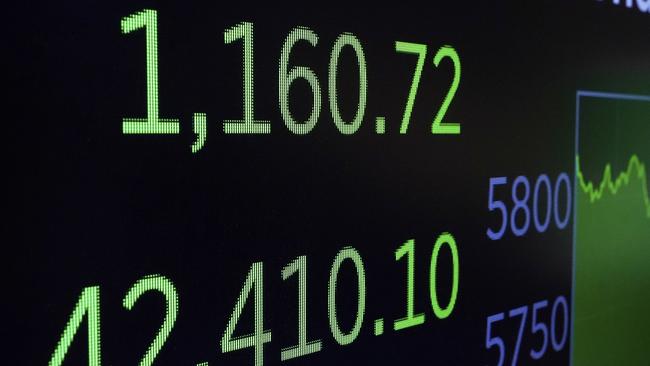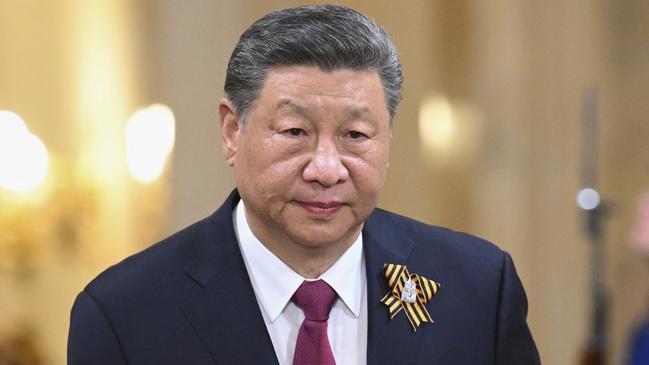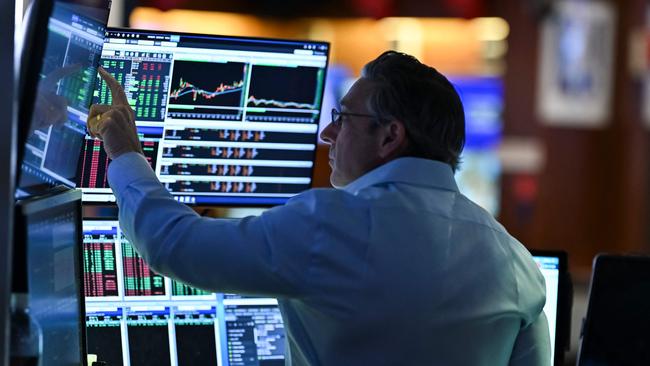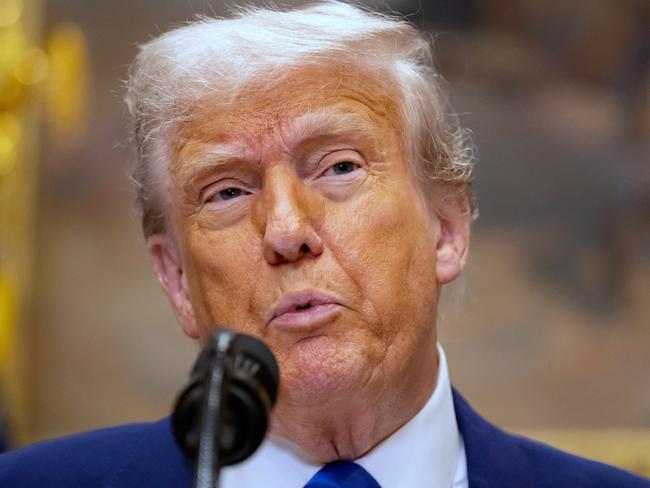Stock markets soar as tariff tensions ease
Aussies will want to check their super balances today, as stock markets have gone wild over a major breakthrough on tariffs.

World
Don't miss out on the headlines from World. Followed categories will be added to My News.
Global stock markets have surged over a major breakthrough on tariffs today, but experts have warned that the global economy is “not in a good place”.
Investors have been going ballistic — with some major US indexes recovering to pre-“Liberation Day” levels — as trade tensions ease following China and the US’ temporary tariff deal.
The world’s two biggest economies agreed on Monday to slash steep tariffs for 90 days after weekend negotiations in Switzerland.
The announcement sent financial markets climbing after weeks of turmoil stoked by US President Donald Trump’s sweeping “Liberation Day” tariffs on April 2.

The Dow Jones Industrial Average has climbed 1,160.72 points, or 2.81 per cent, closing at 42,410.10 – above where the index closed before Liberation Day.
The S&P 500 rose 3.26 per cent to close at 5,844.19 – its highest level since March 3.
The tech-heavy Nasdaq Composite closed at 18,708.34, up 779.43 points or 4.35 per cent.
Here in Australia, the ASX 200 index is on the rise. It rose by 0.93 per cent in early trading, but as of 1.38pm, it has been to a 0.50 per cent rise.
‘This is not a winning formula’
The New York Post’s Rich Lowry has also warned that while markets are relieved by Mr Trump’s temporary slash on 145 per cent tariffs on China, “we aren’t in a great place”.
“A 30 per cent tariff on China, plus the other tariffs that are in play around the globe, means we still have lurched into the highest US tariff regime since the 1930s,” he wrote in a piece for the New York Post.

“Earlier this year, there was a surge of imports in anticipation of Trump’s tariffs, in the phenomenon known as front-loading. Then, imports were basically shut off as the 145 per cent tariffs took hold. And now there will be more front-loading to avoid what comes next.
“An on-again-off-again-on-again approach forces US economic actors to deal with wildly gyrating uncertainty for no good reason. Who knows what will happen in 90 days?”
Mr Lowry argued the President could have taken a less disruptive approach and imposed a 30 per cent tariff on China at the outset.
“The Risk is that Trump, by tariffing everyone, friend or foe, has made it harder for us to deepen relationships with our allies and isolate our adversary,” he wrote.
“As Robert Atkinson of the Information Technology and Innovation Foundation points out, the current tack will also hamper the most strategically important, technologically advanced US firms that are all globally integrated.
“The Trump tariffs will increase their costs by making imported inputs more expensive, while limiting their foreign markets by inviting foreign retaliation for Trump’s tariffs.
“This is not a winning formula, and if China gets an upper hand as a result, there will be no easy do-over.”
Other experts are seeing the bright side.
“Stocks are surging, safe havens are rapidly declining, and expectations for Federal Reserve rate cuts have been dramatically scaled back,” said Kathleen Brooks, research director at traders XTB.

“The market was not expecting the big change to US and China tariff rates, which is very positive for the outlook for the US and the global economy,” she added.
Hong Kong’s stock market closed up three per cent in reaction. Paris led the way in Europe, gaining 1.4 per cent, while Frankfurt notched yet another record high, although it later gave up most of its gains.
The big gainer in the French capital was luxury giant LVMH, the maker of Louis Vuitton handbags, whose shares gained seven per cent.
The dollar rallied against the euro, yen and British pound, while oil prices jumped over two per cent.

‘Total reset’: US and China temporarily slash tariffs
The relief comes as the US and China signed an agreement to drastically reduce tit-for-tat tariffs for 90 days in what Mr Trump dubbed a “total reset”.
The US agreed to lower its tariffs on Chinese goods to 30 per cent – down from 145 per cent – while China will reduce its own to 10 per cent – down from 125 per cent – starting on May 14.
“Yesterday we achieved a total reset with China after productive talks in Geneva,” Mr Trump said.
“I’ll speak to President Xi, maybe at the end of the week.”

US Treasury Secretary Scott Bessent said weekend discussions with Chinese Vice Premier He Lifeng and international trade representative Li Chenggang were “productive” and “robust”, with both sides anticipated to meet again soon.
“Both sides showed great respect,” he told reporters.
These actions are to be taken by Wednesday.
Mr Bessent told CNBC that he expects US and Chinese representatives to meet again in the coming weeks to work out “a more fulsome agreement.”
While Washington does not want broad decoupling from China, it seeks “decoupling for strategic necessities,” Mr Bessent said.
He added to CNBC that the purpose of the 90-day pause was also to see what the US could do about non-tariff barriers weighing on US firms.
China hailed the “substantial progress” made at the talks, held at the discreet villa residence of Switzerland’s ambassador to the United Nations in Geneva.
This move “is in the interest of the two countries and the common interest of the world,” the Chinese commerce ministry said, adding that it hoped Washington would keep working with Beijing “to correct the wrong practice of unilateral tariff rises.”
With the agreement, China also committed to suspending or removing non-tariff countermeasures.
‘Markets to remain volatile’
Despite the surge, Karsten Junius at bank J. Safra Sarasin has urged caution.
“We expect financial markets to remain volatile over the coming months, as they have almost fully priced out negative economic surprises and could once again be disrupted by more serious obstacles in trade negotiations,” he said.
“In all likelihood, things may still get worse before they get better.”
– With AFP
Originally published as Stock markets soar as tariff tensions ease





